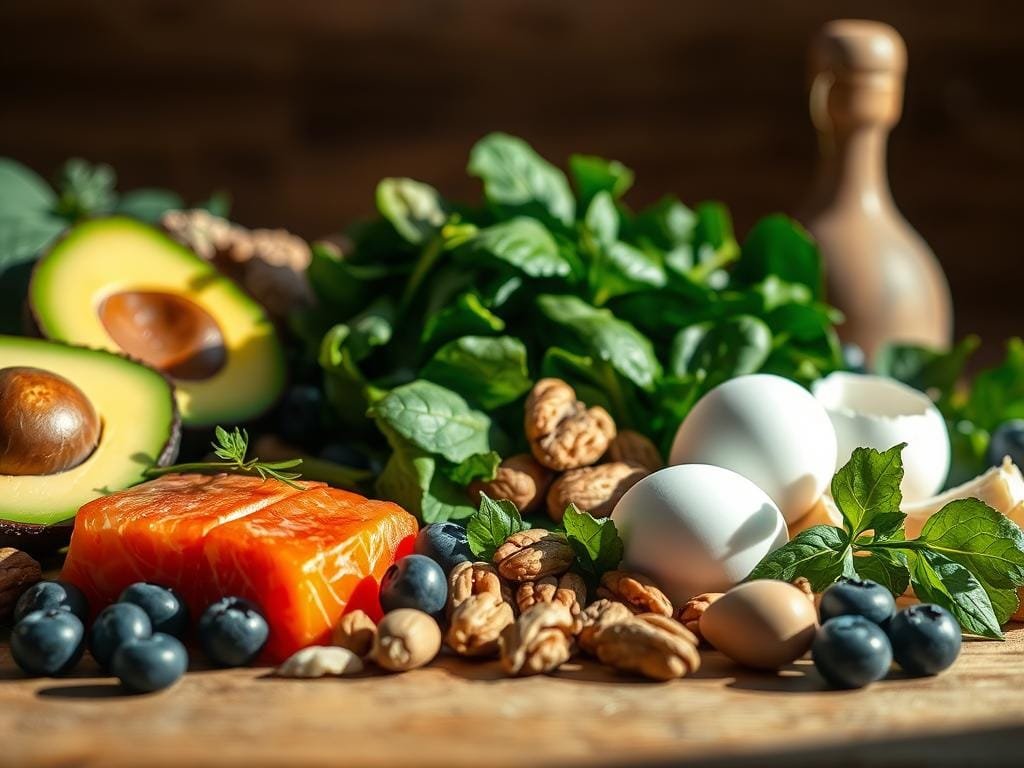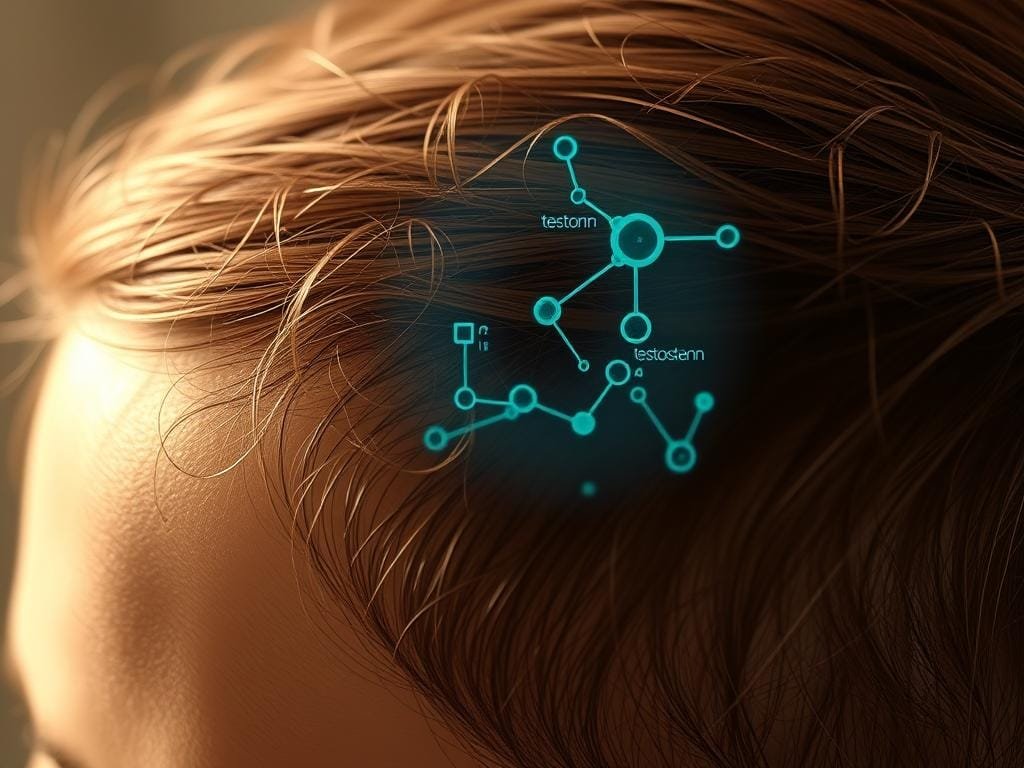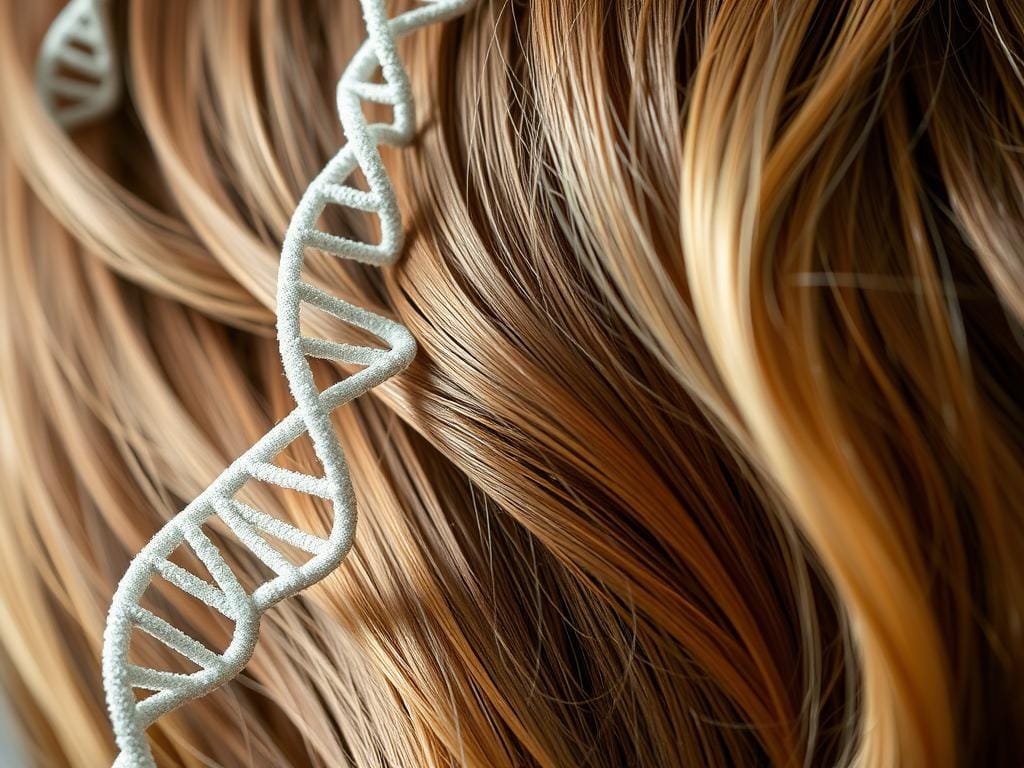Did you know that the average person loses around 50-100 strands of hair daily? It might sound scary, but knowing the science of hair growth can help you get thicker, healthier hair naturally.
From ancient times to today’s dermatology, the secrets to beautiful hair are out there. By learning how your hair grows, you can start working towards the hair you’ve always wanted.
Table of Contents
Key Takeaways
- Understanding the science behind hair growth is key to getting thicker, healthier hair.
- Ancient traditions and modern dermatology offer valuable insights into hair growth.
- Simple changes to your daily routine can greatly improve your hair’s health.
- Nourishing your hair from the inside is vital for the best growth.
- Using a holistic approach can lead to naturally healthier and thicker hair.
Understanding Hair Growth: The Basics
Knowing how hair grows is key to getting thicker, healthier hair. Hair growth is a complex process with many stages. It’s influenced by different factors.
The Hair Growth Cycle Explained
The hair growth cycle has four main stages: anagen, catagen, telogen, and exogen. The anagen phase is when your hair grows fast. This phase can last from two to six years or more, based on your genetics.
The catagen phase is a short transition that lasts about two to three weeks. During this time, the hair follicle shrinks and detaches from the dermal papilla.
The telogen phase, or resting phase, lasts about three to four months. At the end of this phase, the hair follicle re-enters the anagen phase. A new hair starts to form.
Lastly, the exogen phase is when the hair is released from the follicle. It’s normal to lose some hair daily during this phase.
| Phase | Description | Duration |
|---|---|---|
| Anagen | Active growth phase | 2-6 years |
| Catagen | Transitional phase | 2-3 weeks |
| Telogen | Resting phase | 3-4 months |
| Exogen | Shedding phase | Varies |
Factors That Influence Hair Growth
Many things can affect hair growth, like genetics, nutrition, and health. Genetics play a significant role in your hair’s growth rate, texture, and thickness.
Nutrition is also key, as a diet rich in vitamins and minerals can help hair grow. Foods high in protein, iron, and zinc are good for hair.
Common Myths About Hair Growth
There are many myths about hair growth. One myth is that cutting your hair often can make it grow faster. While regular trims can prevent split ends, they don’t speed up hair growth.
Another myth is that certain products can greatly improve hair growth. While some products can nourish your hair and scalp, their effectiveness varies.
To stimulate hair growth, keep your scalp healthy, reduce stress, and use gentle hair care products. Using tips for faster hair growth in your daily routine can help a lot.
Learning how to stimulate hair growth naturally means understanding your hair type and needs. By taking a holistic approach to hair care, you can get healthier, thicker hair.
Nutritional Factors Affecting Hair Growth
Eating foods rich in essential nutrients is key to having beautiful hair. What you eat feeds your hair follicles, helping them grow strong and healthy. This keeps your hair looking great.
Key Vitamins and Minerals for Healthy Hair
Some vitamins and minerals are super good for your hair. Vitamins A, C, D, and E, along with zinc, biotin, and iron, are great. Vitamin A, for example, helps make sebum, which keeps your scalp healthy. You can find these in many foods, making sure your hair gets what it needs.
Vitamins and Minerals for Hair Growth:
| Nutrient | Benefit | Food Sources |
|---|---|---|
| Vitamin A | Promotes sebum production, keeping the scalp healthy | Carrots, sweet potatoes, spinach |
| Vitamin C | Enhances collagen production, improving hair texture | Citrus fruits, strawberries, bell peppers |
| Biotin | Strengthens hair follicles, promoting thicker hair | Nuts, eggs, whole grains |
| Iron | Essential for hair growth, preventing hair loss | Red meat, spinach, fortified cereals |
Foods That Promote Hair Growth
Adding certain foods to your diet can really help your hair grow. Foods with omega-3 fatty acids, like salmon, are great for your scalp. Foods full of antioxidants, like berries, also help by reducing stress on your hair.
Here are some top foods for hair growth:
- Salmon and other fatty fish rich in omega-3 fatty acids
- Nuts and seeds, such as almonds and sunflower seeds, rich in vitamin E
- Leafy greens like spinach, rich in iron and antioxidants
- Sweet potatoes, rich in vitamin A
- Eggs, a good source of biotin and protein
For more info on hair growth nutrition, check out studies on PubMed Central.
The Role of Hydration in Hair Health
Drinking enough water is key for healthy hair. It keeps your hair follicles moist, helping them grow and preventing dryness. Drink lots of water every day to keep your body and hair hydrated.

By eating well and staying hydrated, you can make your hair healthier and grow faster. Adding the right foods and vitamins to your diet can make your hair thicker and stronger over time.
The Impact of Hair Care Products on Growth
Choosing the right hair care products is key for healthy hair and growth. The products you pick can either nourish your hair and scalp or damage them, slowing growth.
Ingredients to Look For
When picking hair care products, look for ingredients that boost hair health. Some good ones include:
- Biotion and other natural ingredients that nourish the hair follicles.
- Coconut oil and argan oil for moisturizing and protecting the hair.
- Keratin and other proteins that help repair and strengthen hair.
Harmful Chemicals to Avoid
It’s just as important to know what to avoid. Some chemicals in hair care products can harm your hair and scalp, causing loss. Avoid these:
- Sulfates, which can strip the hair of its natural oils.
- Parabens, which have been linked to various health concerns.
- Alcohols that dry out the hair and scalp.
Choosing the Right Shampoo and Conditioner
Shampoo and conditioner are essential for any hair care routine. Picking the right ones for your hair type is vital. Here’s what to consider:
| Hair Type | Shampoo | Conditioner |
|---|---|---|
| Dry Hair | Moisturizing, sulfate-free | Hydrating, with ingredients like coconut oil |
| Oily Hair | Clarifying, with tea tree oil | Light, non-greasy |
| Color-Treated Hair | Gentle, color-protecting | Color-safe, with antioxidants |
By picking hair care products that meet your hair’s needs, you can keep your scalp healthy and encourage hair growth.
Hormones and Hair Growth
Hormones are key to hair growth. Knowing how they work can help you get thicker, healthier hair. Changes in hormones can affect how fast your hair grows, its texture, and even cause hair loss.

How Hormones Affect Your Hair
Hormones send messages to our body, including about hair growth. Androgens, estrogens, and thyroid hormones are important for hair health. Androgens can make hair thinner, while estrogens help hair grow longer.
Dr. Joshua Zeichner, a dermatologist at Mount Sinai Hospital, says hormonal changes can cause hair loss or thinning. Knowing how hormones affect your hair is important for solving hair growth problems.
Conditions Linked to Hormonal Changes
Some conditions are caused by hormonal imbalances that affect hair growth. These include:
- Polycystic ovary syndrome (PCOS)
- Thyroid disorders (hypothyroidism and hyperthyroidism)
- Menopause and pregnancy
These conditions can change how hair grows. For example, pregnancy can make hair thicker, but after giving birth, hormonal changes can cause hair to fall out.
“Hormonal fluctuations during menopause can lead to changes in hair growth and texture, often resulting in thinner, drier hair.”
Natural Ways to Balance Hormones
There are natural ways to balance hormones for better hair growth. Some include:
- Eating a healthy diet with omega-3 fatty acids and antioxidants
- Exercising regularly to reduce stress
- Getting enough sleep to help hormones
- Using stress-reducing activities like meditation or yoga
By making these lifestyle changes, you can balance your hormones and support hair growth. Adding hair growth treatments that match your body’s natural balance can also help.
The Role of Genetics in Hair Growth
Learning about genetics and hair growth can guide your hair care choices. Your genes affect your hair’s thickness, texture, and how fast it grows. Even though you can’t change your genes, knowing how they impact your hair helps you care for it better.
Understanding Your Genetic Makeup
Your genetic makeup comes from your parents. It influences your hair’s thickness, color, and growth cycle. Knowing your family’s hair traits can give you clues about your own hair.
Key Genetic Factors Influencing Hair Growth:
- The length of your hair growth cycle
- The thickness and texture of your hair
- The rate at which your hair grows
How Family History Influences Hair Health
Family history is key to understanding your hair health. If your family has hair loss or thinning, you might too. Knowing this can help you take steps to keep your hair healthy. For example, if balding runs in your family, looking into natural hair growth remedies might be wise.
| Family History | Likelihood of Hair Loss | Recommended Actions |
|---|---|---|
| Parents with healthy hair | Low | Maintain a healthy diet and hair care routine |
| Family history of balding | High | Consider natural hair growth remedies and consult a specialist |

Understanding your genetics and family history can help you promote healthy hair growth. While genetics is important, other factors like diet and scalp health also matter. For more tips on natural hair care and scalp health, check out our resources.
Hair Growth Supplements: Do They Work?
Eating well is key, but supplements can help fill nutritional gaps for hair growth. If you’re thinking about adding supplements to your hair care, knowing their benefits and limits is important.
Popular Supplements to Consider
Many supplements are marketed to help hair grow. Here are some of the most popular ones:
- Biotin: It’s known for keeping hair healthy, making it a top choice for supplements.
- Vitamin C: This vitamin acts as an antioxidant, protecting hair follicles from harm.
- Fish Oil: Full of omega-3 fatty acids, fish oil supplements are good for the scalp.
- Saw Palmetto: Some research shows it might block a hormone linked to hair loss.
For more on hair vitamins, check out Healthline’s article on hair vitamins.
What the Research Says
Studies on hair growth supplements show mixed results. Some, like biotin, might help if you’re lacking in nutrients. But, more research is needed to know their full effect on those with normal nutrient levels.
Potential Side Effects to Be Aware Of
While usually safe, hair growth supplements can have side effects. Common ones include:
- Gastrointestinal upset: Some people might feel queasy or have stomach issues.
- Allergic reactions: There’s a chance of allergic reactions to certain ingredients.
- Interactions with medications: Supplements can affect how medications work, so talk to a doctor before starting.
Knowing the good and bad can help you decide if hair growth supplements are for you.
Stress and Its Impact on Hair Growth
Chronic stress can cause hair loss by disrupting the hair growth cycle. When stressed, our body’s functions, including hair growth, are affected. Stress can push hair into a resting phase, leading to more shedding.

The Link Between Stress and Hair Loss
Stress can lead to hair loss by pushing more hairs into the telogen phase. The National Institutes of Health says stress can disrupt the hair growth cycle, causing more shedding.
Stress can affect hair growth in several ways:
- Increased cortisol levels can disrupt the normal hair growth cycle.
- Stress can lead to inflammation, which may affect the scalp.
- Hormonal changes due to stress can affect hair growth.
Stress Management Techniques
Managing stress is key to healthy hair growth. Here are some ways to reduce stress:
- Meditation and Yoga: These practices can lower stress levels.
- Exercise Regularly: Physical activity helps reduce stress.
- Adequate Sleep: Getting enough sleep is important for managing stress.
Eating a balanced diet rich in vitamins and minerals also supports hair health. Foods like berries and leafy greens are good for hair.
| Stress Management Technique | Benefits for Hair Growth |
|---|---|
| Meditation and Yoga | Reduces cortisol levels, promoting a healthy scalp. |
| Regular Exercise | Improves overall health, including hair health. |
| Adequate Sleep | Supports hormonal balance, essential for hair growth. |
When to Seek Professional Help
If stress causes significant hair loss, seek professional help. A dermatologist can offer treatments and stress management advice.
For tips on faster hair growth and how to stimulate hair growth, a healthcare professional can provide personalized advice.
Natural Remedies for Promoting Hair Growth
Discover the power of natural remedies to grow thicker, healthier hair. For ages, people have used nature to improve their hair. These remedies are gentler than harsh chemicals and work with your body to grow hair.
Essential Oils for Thicker Hair
Essential oils are popular for growing hair. Oils like rosemary, lavender, and peppermint stimulate hair growth. Rosemary essential oil boosts scalp circulation, helping hair grow.
Here’s a simple guide to get you started:
- Mix 2-3 drops of rosemary essential oil with 1 tablespoon of coconut oil.
- Massage the mixture into your scalp for 5-10 minutes.
- Leave it on for at least 30 minutes before washing your hair.
Herbal Treatments to Consider
Herbal treatments have been used for centuries to grow hair. Herbs like saw palmetto and horsetail are full of nutrients for hair follicles. Saw palmetto blocks DHT, a hormone that causes hair loss.
A study in the Journal of Alternative and Complementary Medicine shows saw palmetto works like finasteride. You can take these herbs as supplements or use them in teas and hair masks.
| Herb | Benefits | Usage |
|---|---|---|
| Saw Palmetto | Blocks DHT, promotes hair growth | Supplements, teas |
| Horsetail | Rich in silica, strengthens hair | Hair masks, supplements |
DIY Hair Masks and Treatments
DIY hair masks and treatments are fun and affordable. Ingredients like fermented rice water, honey, and avocado nourish your hair. Fermented rice water, for example, strengthens hair and improves texture.
“Using fermented rice water as a hair treatment can lead to significant improvements in hair health and growth.”
To make a fermented rice water treatment, rinse your rice well, then soak it in water for 30 minutes. Strain the water and let it ferment for 24-48 hours. Use the fermented water as a final rinse after shampooing.
By adding these natural remedies to your hair care, you can get healthier, thicker hair. Remember, natural remedies take time to work.
The Importance of Scalp Health
To get the best hair growth, you need to take care of your scalp. A healthy scalp is key for hair follicles to grow well. This leads to thicker, fuller hair. Regular scalp care stops problems like dandruff and itchiness, which harm hair growth.
How Scalp Care Supports Hair Growth
Scalp care is vital for hair growth. It means cleaning your scalp often to get rid of dirt and oil. Choose a gentle shampoo that fits your hair type.
Adding hair growth vitamins to your diet also helps your scalp. Foods like salmon, walnuts, and spinach are great for a healthy scalp. A balanced diet and good scalp care are the basics for growing hair well.
Tips for a Healthy Scalp
Keeping your scalp healthy needs good hygiene and lifestyle choices. Here are some tips:
- Wash your hair often with a gentle shampoo to avoid buildup.
- Massage your scalp gently to boost blood flow and reduce stress.
- Avoid harsh chemicals that can harm your scalp and hair.
- Drink plenty of water to keep your scalp and hair healthy.
Massage Techniques for Scalp Health
Scalp massage is a simple way to boost hair growth. It improves blood flow to the follicles, nourishing them. Here’s a basic method:
- Use your fingertips to massage your scalp in circular motions.
- Pay extra attention to areas with hair loss or thinning.
- Massage for 5-10 minutes, best before washing your hair.
Hair care experts say scalp massage is as good as hair growth vitamins. Regular scalp massage, along with a balanced diet and proper hair care, can really help hair grow.
| Scalp Care Practice | Benefit |
|---|---|
| Regular Cleansing | Removes dirt and oil, preventing clogged follicles |
| Scalp Massage | Increases blood flow, promoting hair growth |
| Balanced Diet | Provides essential nutrients for hair health |
When to Seek Professional Advice
If you’re seeing a lot of hair loss or thinning, it’s time to talk to a dermatologist. They can find out why you’re losing hair and suggest hair growth treatments.
Signs You Should Consult a Specialist
You should see a specialist if you notice patchy hair loss or overall thinning. Also, if hair loss comes with other symptoms. A dermatologist can check your condition and suggest the best supplements for hair growth.
Exploring Medical Treatments
There are medical treatments for hair loss, like surgery and medication. A dermatologist can guide you through these options. They’ll help find the best treatment for you.
Getting professional advice is the first step to dealing with hair loss. It helps you find a solution that works for you.
